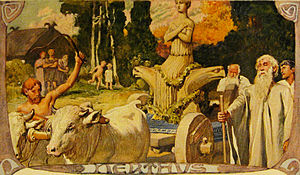
In Germanic paganism, Nerthus is a goddess associated with a ceremonial wagon procession. Nerthus is attested by first century A.D. Roman historian Tacitus in his ethnographic work Germania[1] as a "Mother Earth".
In Germania, Tacitus records that a group of Germanic peoples were particularly distinguished by their veneration of the goddess. Tacitus describes the wagon procession in some detail: Nerthus's cart is found on an unspecified island in the "ocean", where it is kept in a sacred grove and draped in white cloth. Only a priest may touch it. When the priest detects Nerthus's presence by the cart, the cart is drawn by heifers. Nerthus's cart is met with celebration and peacetime everywhere it goes, and during her procession no one goes to war and all iron objects are locked away. In time, after the goddess has had her fill of human company, the priest returns the cart to her "temple" and slaves ritually wash the goddess, her cart, and the cloth in a "secluded lake". According to Tacitus, the slaves are then immediately drowned in the lake.
Scholars have linked Tacitus's description of ceremonial wagons found from around Tacitus's time up until the Viking Age, particularly the Germanic Iron Age Dejbjerg wagon in Denmark and the Viking Age Oseberg ship burial wagon in Norway. The goddess's name Nerthus (from Proto-Germanic *Nerþuz) is the early Germanic etymological precursor to the Old Norse deity name Njörðr, a male deity who is comparably associated with wagons and water in Norse mythology. Together with his children Freyja and Freyr, the three form the Vanir, a family of deities. The Old Norse record contains three narratives featuring ritual wagon processions that scholars have compared to Tacitus's description of Nerthus's wagon procession, one of which (and potentially all of them) focus on Njörðr's son Freyr.
Additionally, scholars have sought to explain the difference in gender between the early Germanic and Old Norse forms of the deity, discussed potential etymological connections to the obscure female deity name Njörun, mention of the mysterious Sister-wife of Njörðr, proposed a variety of locations for where the procession may have occurred (generally in Denmark), and considered Tacitus's sources for his description.
Tacitus's Nerthus has had some influence on popular culture, and in particular the now widely rejected manuscript reading of Hertha in Germany.